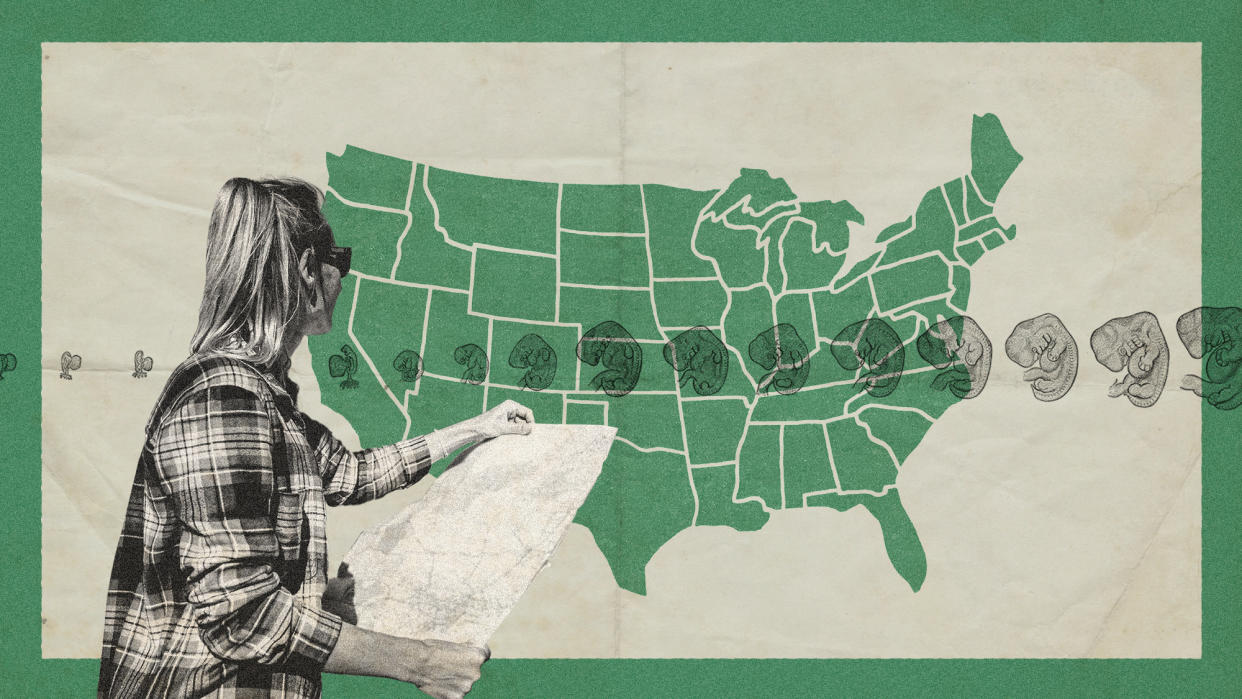In what states is abortion legal, illegal, and in limbo?

Since the U.S. Supreme Court overturned Roe v. Wade in 2022, nearly two dozen states have enacted laws that put strict limits on abortion. Some states have taken the extreme step of outlawing abortion at any point and criminalizing the act to penalize people seeking abortions and the health providers who help them. With the 2024 elections looming, abortion rights will be on ballots and in courtrooms across the country.
At least partly legal
Abortion remains mostly legal in 27 states, though there are varying restrictions based on gestational age. In some cases, states have added new protections for abortion since the Dobbs ruling by enshrining the right into their state constitutions. While a few of these laws face legal challenges, abortion care remains accessible to some degree.
On the lower end of the gestational limits are Georgia and South Carolina, where abortion is legal until six weeks. Many advocates, however, argue that such an early cutoff amounts to a complete ban, in practice, since many don't yet know they are pregnant at that point. Last October, the Georgia Supreme Court reversed a lower court's ruling that voided the 2019 ban, and the South Carolina Supreme Court upheld its ban in August 2023 after ruling that a similar ban from 2021 was unconstitutional. A six-week ban goes into effect on May 1 in Florida, which currently allows abortions up until 15 weeks of pregnancy. The Florida Supreme Court ruled in April that the state Constitution's privacy protections do include abortion, "overturning decades of legal precedent and effectively triggering the more restrictive law," said The New York Times.
Other states have a "viability" cutoff, meaning abortion is prohibited after the fetus is viable. This is generally considered to be around 23 or 24 weeks into pregnancy, but the term is divisive, said The Associated Press. Medical advances mean viability can potentially arrive increasingly early in gestation, and some say it's an "arbitrary dividing line."
States with a gestational limit up to 18 weeks: Georgia (6 weeks), South Carolina (6 weeks), Nebraska (12 weeks), North Carolina (12 weeks), Arizona (15 weeks), Florida (15 weeks), and Utah (18 weeks)
States with a gestational limit beyond 18 weeks: Iowa (22 weeks), Kansas (22 weeks), Wisconsin (22 weeks), Massachusetts (24 weeks), New Hampshire (24 weeks), Nevada (24 weeks), New York (24 weeks), Pennsylvania (24 weeks), Virginia (third trimester), California (viability), Connecticut (viability), Delaware (viability), Hawaii (viability), Illinois (viability), Maine (viability), Montana (viability), Rhode Island (viability), Washington (viability), and Wyoming (viability)
States with no ban or gestational limit: Alaska, Colorado, District of Columbia, Maryland, Michigan, Minnesota, New Jersey, New Mexico, Oklahoma, and Vermont
Largely illegal
Since the Dobbs decision, 14 states have instated near-total bans on abortions after conception, with a few exceptions for medical emergencies, if the pregnancy is life-threatening, or if there is some kind of fetal anomaly. A few also make an exception for cases of rape or incest. A few bans have been held in place despite pushback in court. A lower court judge temporarily blocked the part of Idaho's ban that enabled the state to prosecute doctors for terminating pregnancies in medical emergencies. Still, the Supreme Court put that ruling on hold, allowing the ban to move forward unobstructed until it hears oral arguments in Idaho v. United States on April 24, 2024.
Texas has several abortion bans on the books, including a 1925 law that Texas Attorney General Ken Paxton said was a "100% good law" that prosecutors could enforce after Roe v. Wade was repealed, a six-week ban that took effect in 2021, and a "trigger ban" that makes abortion a crime punishable by up to life in prison, said The Washington Post. Private citizens in the state can also sue abortion providers who help patients seeking an abortion after about six weeks of pregnancy.
States with a near-total ban: Alabama, Arkansas, Idaho, Indiana, Kentucky, Louisiana, Mississippi, Missouri, North Dakota, Oklahoma, South Dakota, Tennessee, Texas, and West Virginia
In limbo
In several states, the debate over abortion care will play out in court as proposed bans face legislative pushback for various reasons. Arizona currently allows abortions up to 15 weeks of pregnancy, but the Arizona Supreme Court recently ruled that an 1864 ban on nearly all abortions was "enforceable." The ban will likely remain unenforced for at least 60 days but could face challenges from state attorneys.
Both Montana and Wyoming have had multiple abortion bans blocked by the court based on the fact that their constitutions protect the right to an abortion. In the former, the state legislature passed a law in 2023 that clarified that the right of privacy embedded in the state constitution does not include abortion rights. In the latter, the Supreme Court has yet to weigh in.
Iowa's Gov. Kim Reynolds (R) signed a six-week abortion ban, but it was swiftly blocked in courts days later. Last year, a "deadlocked state Supreme Court kept a nearly identical six-week ban from 2018 permanently blocked," said The New York Times. In Wisconsin, Planned Parenthood resumed offering abortion services after a judge ruled that an 1849 law "widely interpreted as an abortion ban did not apply to abortion," said the Post.
Idaho currently has a total ban on abortions, and the state Supreme Court ruled there is no constitutional right to an abortion. However, the state's ban will soon face the U.S. Supreme Court, where the justices will hear a case against one of the country's most restrictive bans. The Department of Justice argues that the strict restrictions, which have no exceptions for incest, rape, or health risks, conflict with a 1986 federal law that requires hospitals that participate in the Medicare program to "provide stabilizing treatment to emergency room patients regardless of their ability to pay," said The Harvard Gazette.
States where abortion care is in legal limbo: Arizona, Idaho, Iowa, Montana, Wisconsin, and Wyoming

